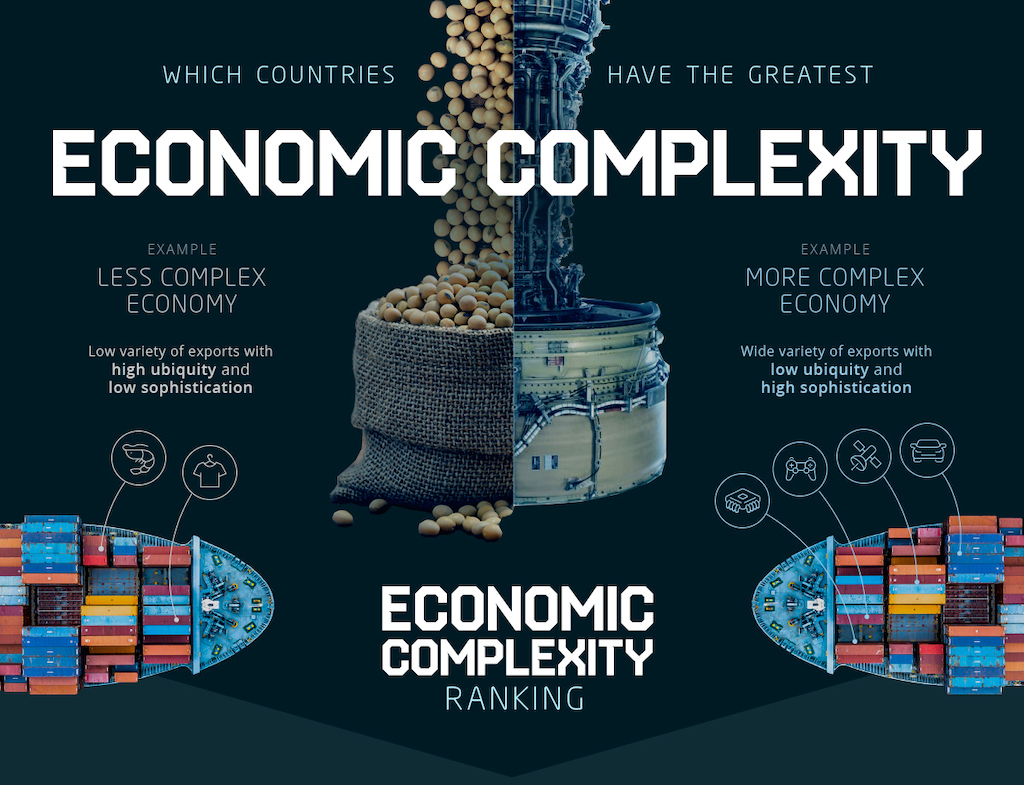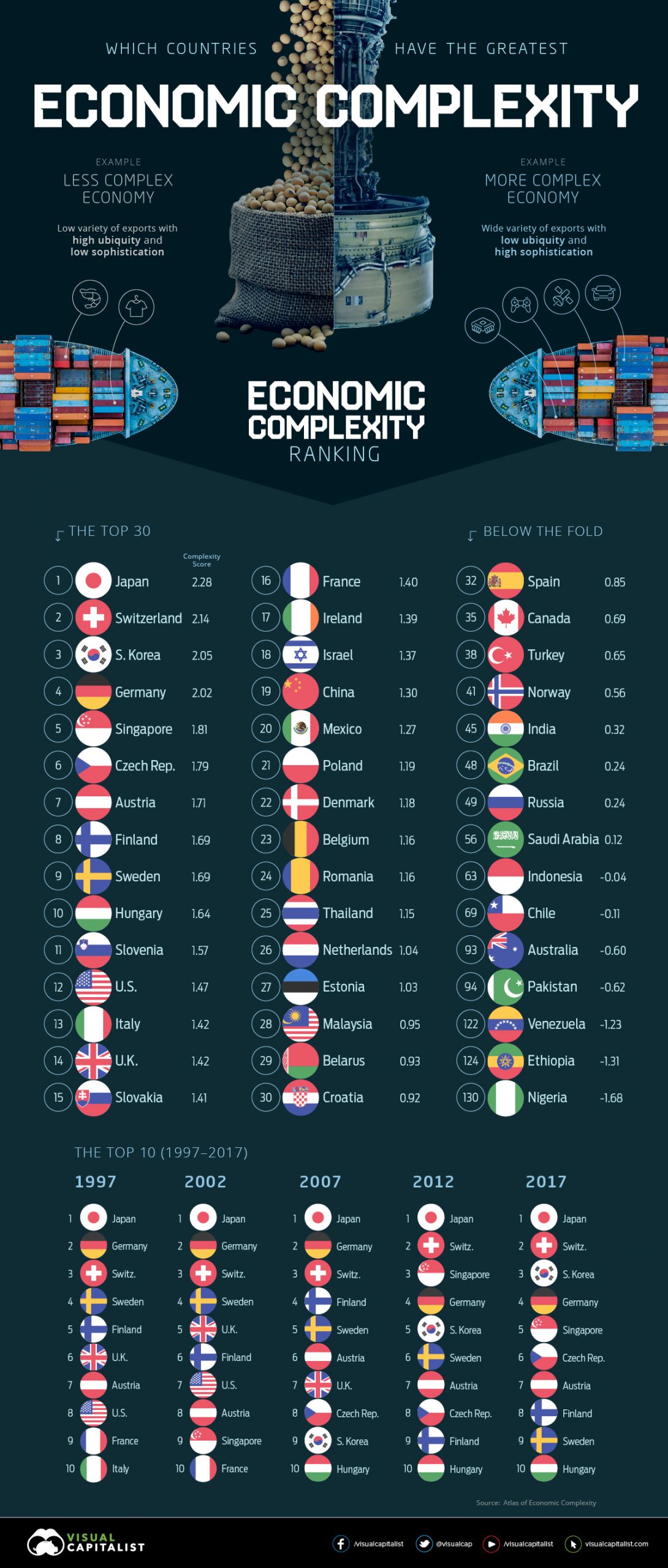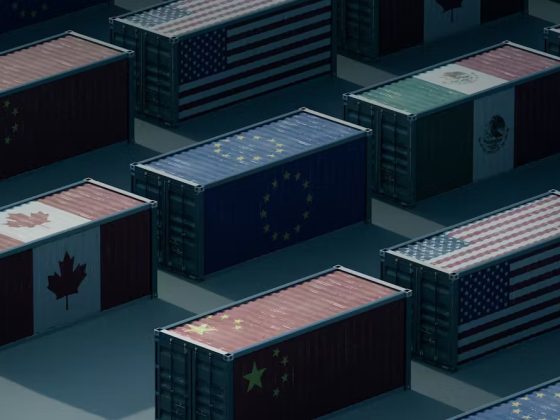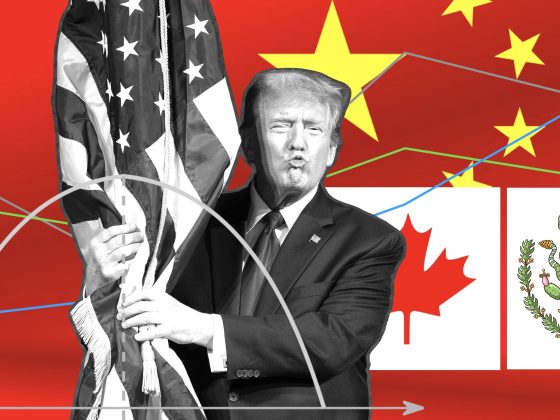These are the world’s most complex economies. But what does it mean to be ‘complex’?
Here are the world’s most complex economies, according to the data from The Atlas of Economic Complexity.
The Atlas of Economic Complexity is a tool developed and maintained by Harvard’s Growth Lab to facilitate the exploration of the economic structure of countries around the world.
The metric for economic complexity used for the ranking is known as the Economic Complexity Index (ECI). A higher ECI score is indicative of higher economic complexity.
Highlights
As of 2017, Japan is the most economically-complex country, with an ECI score of 2.28, retaining its position since the rankings were created back in the 1990s. The country’s standout industries for export are car, electronics, and information and communications technology (ICT).
Europe owns seven of the top ten spots in economic complexity: Switzerland (2nd), Germany (4th), Czech Republic (6th), Austria (7th), Finland (8th), Sweden (9th), and Hungary (10th).
Meanwhile, apart from taking the top spot, Asia occupies the remaining places in the top ten with South Korea (3rd) and Singapore (5th).
On the flip side, Guinea is the least-complex country in terms of its economic structure, with an Index score of –1.68, ranking the country in 133rd place.
Africa takes eight of the bottom ten spots: Guinea (133rd), Angola (132nd), Burkina Faso (131st), Nigeria (130th), Congo (129th), Mauritania (126th), the Democratic Republic of the Congo (125th), and Ethiopia (124th).
Other countries positioned in the bottom ten in economic complexity are Azerbaijan (127th) and Papua New Guinea (128th).
For the full rankings, you can check the Atlas of Economic Complexity.
What is ‘economic complexity’?
For these rankings, the ECI was used as a measure for economic complexity. But what does ‘economic complexity’ mean to begin with?
The underlying concept used for the ECI is economist Adam Smith’s idea of division of labor discussed in his magnum opus, The Wealth of Nations. In essence, by dividing the economy into markets and organisations, knowledge that is held by the few will be distributed to the collective.
Economic complexity, therefore, refers to the complexity of the networks of people and organisations which facilitate interactions between individuals and catalyse the expansion of the collective knowledge base.
Following this idea, measuring economic complexity is difficult. ECI simplifies this problem by only looking at the country’s economic output.
ECI is a proxy metric of economic complexity which takes into account two factors: diversity and ubiquity of exports. Using the ECI definition, a country with high complexity with high diversity and low ubiquity.
If a country has high diversity, then that country has a lot of products that they can export. However, this is only possible if they have the necessary skill sets needed for the manufacturing of each of these products.
To acquire these skill sets, the working assumption under the ECI definition is that there is a need for an underlying complex economic structure to facilitate the exchange of knowledge.
Meanwhile, low ubiquity implies that only a few countries share the ability to export a product. If a country is connected to other countries through a non-ubiquitous product, this implies that the country possesses the skill set needed to produce the said product. Again, this implies an underlying complex economic structure if we follow the working assumptions of ECI.
What can nations do to increase their economic complexity? They can either explore combinations of existing capabilities or gain new capabilities, both of which will lead to the development of new products. This will mainly target the diversification of products available for export.
On the other hand, the identification of key sectors that are unique to the country to focus on will help lower the ubiquity of exports.










